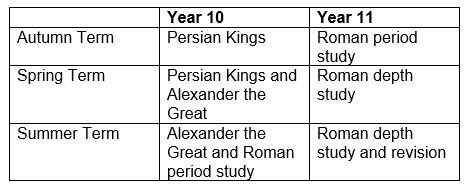Key Stage 4: Ancient History
Curriculum Intent
KS4 Ancient History at Murray Park School aims to create knowledgeable, engaged and resilient learners; students who are equipped with a Historical understanding and skill set that allows them to develop and succeed beyond their own lived experiences.
Within the GCSE students will study topics that push far beyond a British sphere of thinking and will challenge the students to always consider the relevance and significance of cultures and areas beyond a traditional European narrative of History. Carefully selected optional units will allow students to study key figures from Ancient History, albeit in very new lights, and balanced source analysis will develop a deeper, more knowledgeable understanding of the ancient past and the intricacies of the world these characters inhabit. All allowing students to develop into respectful historians who understand the value and importance in the lived experiences of different ethnicities and cultures.
Ancient History differs from a GCSE in History due to the nature of the sources you will use. While archaeological and other evidence is considered, much of our knowledge of comes from ‘historians’ of the time who actually saw themselves as writers of literature or moral philosophy. Through these sources, you will learn about and judge the actions of Alexander of Macedon, who expanded the Greek-speaking world over much of Asia; you will see how Cyrus the Great established a Persian Empire and how a female ruler and how the Roman invasion of Britain unfolded. This course consequently offers a wide range of reading and invites the student to apply both their knowledge and interpretation of this work in the exams. During the course of this GCSE (9–1) in Ancient History, learners will have the chance to study significant events, individuals, societies, developments and issues in their broader historical contexts. The topic areas selected for this specification range from the 8th century BC to the 1st century AD, and allow learners to study four different societies.
OCR’s GCSE in Ancient History will enable learners to:
- Develop and extend their knowledge and understanding of the military, political, religious, social and cultural history of the ancient world, allowing students to be able to consider the events studied within the context of the history of the ancient world.
- Develop the ability to ask relevant questions about the past, to investigate issues critically and to make valid historical claims by using a range of ancient sources in their historical context.
- Understand that ancient historians today rely on few sources that are available for modern history, meaning that our version of events often relies on very scarce evidence, and the resulting difficulties in reconstructing the history of the ancient world.
- Demonstrate their knowledge and understanding of what we believe happened in ancient times and the ancient sources to justify our belief, and reach substantiated conclusions which take into account the reliability of the available ancient sources.
Curriculum Overview
Greece and Persia
This component has two elements: a period study and a source-based depth study. Learners must study the compulsory period study plus one of the three source-based depth studies. Each of the depth studies has a link to the period study, and will ensure that learners do not have a narrow approach to their study, but will be able to see change and developments, and make substantiated judgements, over a substantial length of time, so that they can see issues in a wider perspective.
This period study follows the unfolding narrative of the rise of the Persian Empire under the first four Achaemenid kings between 559 and 465 BC. After an initial focus on the foundation of the empire under Cyrus the Great, the study examines the expansion of Persian territory and construction projects of Cyrus’ successors before exploring the Persians’ attempts to expand into Greece and the resistance they faced. Learners will need to understand the nature of the Persian Empire in this period and the role of the kings in shaping its development.
The compulsory period study focuses on the unfolding narrative of the Persian Empire under Cyrus the Great, Cambyses II, Darius I and Xerxes I.
Students study one depth study:
Alexander the Great, 356—323 BC.
This depth study covers similar geographical areas to the period study but allows learners to understand the Macedonian invasion, conquest of the Persian Empire and advance as far as India. The events covered in this depth study allow learners to study some of the events associated with the end of the Achaemenid Empire, which began under Cyrus the Great.
Paper details: The paper is 1 hour 45 minutes long and is worth 50%.
Rome and its neighbours
This longer period study enables learners to explore the early development of Ancient Rome and to be able to put this development into the wider context of the ancient world. Learners will compare the rates and types of change affecting political and social structures, cultural and religious practices, and military advances across the four time spans outlined. This study enables learners to explore the complex relationships between the kings, the Roman people and other countries in this period and later during the Republican era, the changing role of plebeians and patricians, and Rome’s growing influence in the ancient world.
The following four sub-themes are addressed across the longer period study:
- Political change
- Religious and social change
- Impact of warfare and military change
- Separating myth from reality.
The longer period study has a requirement for learners to understand the nature and origin of the historical evidence for this period. This is brought out in the fourth theme to allow learners to separate myth from the individuals and events which may have a historical basis. The longer period study will be worth 27.5% of the overall specification and should take approximately 33 to 38 guided learning hours to teach.
Students study one depth study:
Britannia: from conquest to province, AD 43 — c. 84.
This depth study enables learners to understand the complex factors that contributed to the invasion of Britain in AD 43 and the subsequent conquest and consolidation of the Roman position up until the end of Agricola’s governorship. This depth study provides learners with the opportunity to explore the political, military, economic, social and cultural factors that affected the relationship between the Britons and the Romans.
Paper details: The paper is 1 hour 45 minutes long and is worth 50%.

Extra-curricular activities
Pupils will have the opportunity to take part in day trips linked to the study of our course. We are planning a day trip to the British museum to explore Ancient sources and monuments.
Useful Websites
http://www.bbc.co.uk/history/ancient/
https://www.history.com/topics/ancient-history
https://www.britishmuseum.org/
https://warwick.ac.uk/fac/arts/classics/warwickclassicsnetwork/stoa/anchist/gcse

